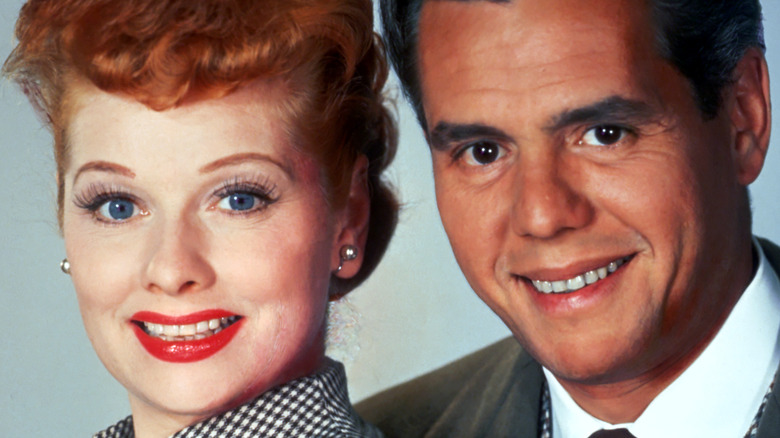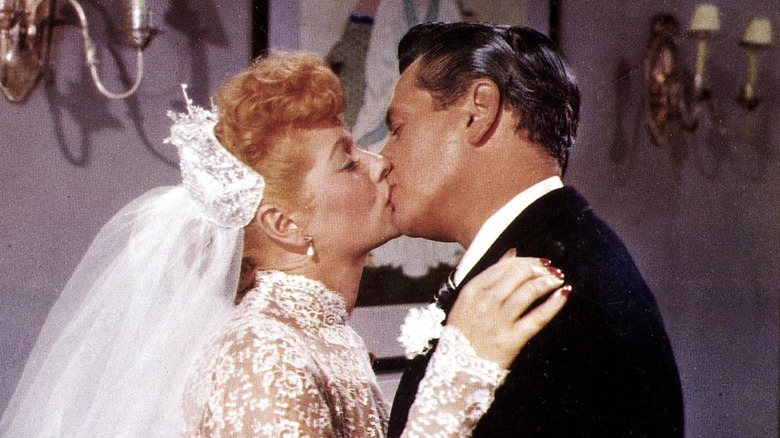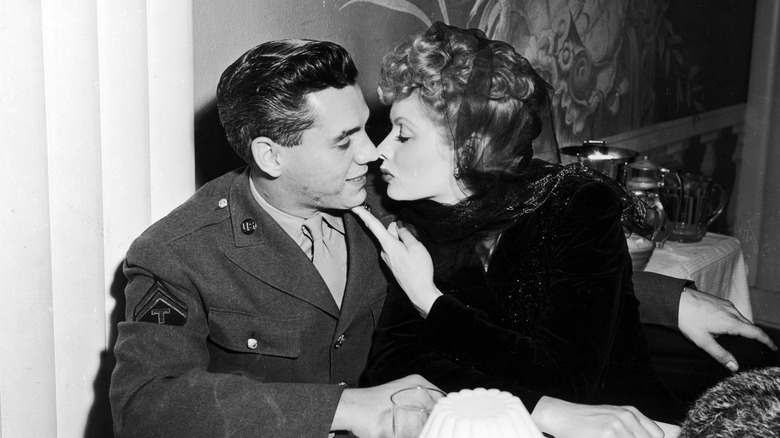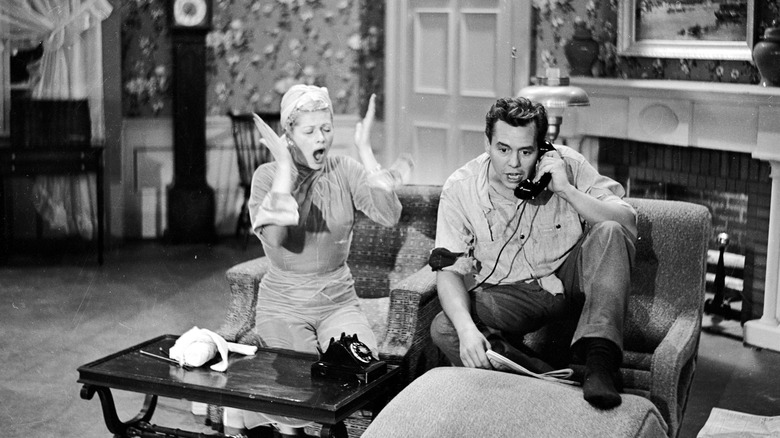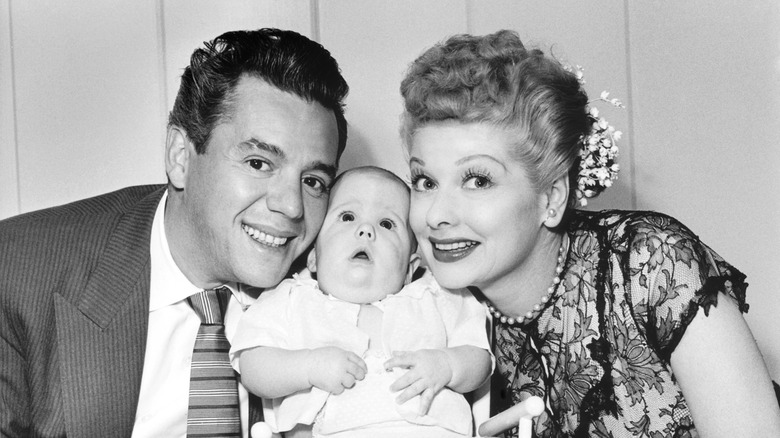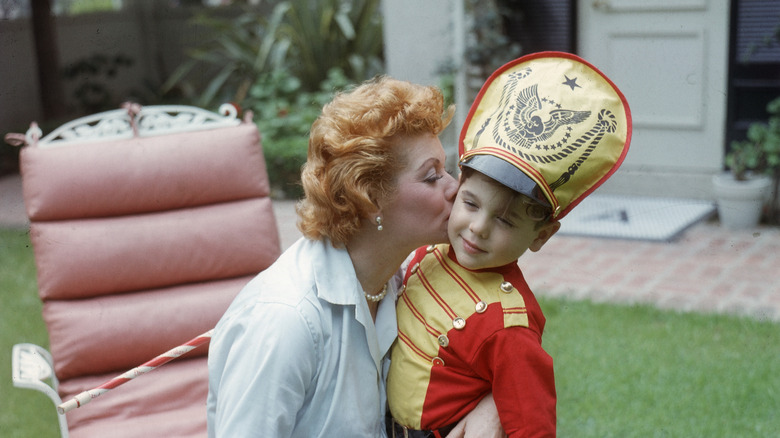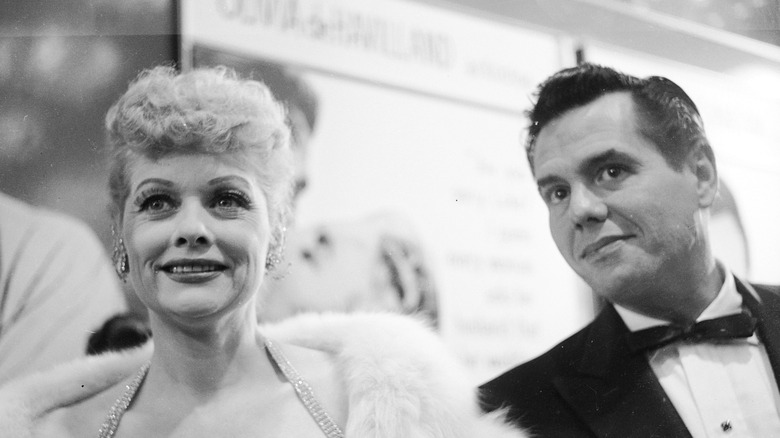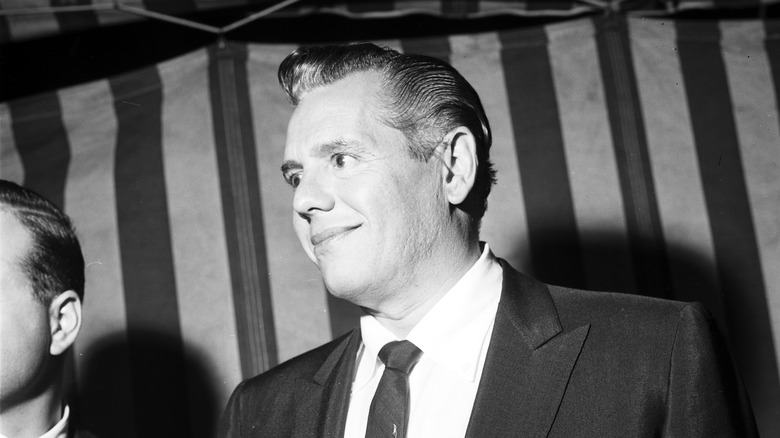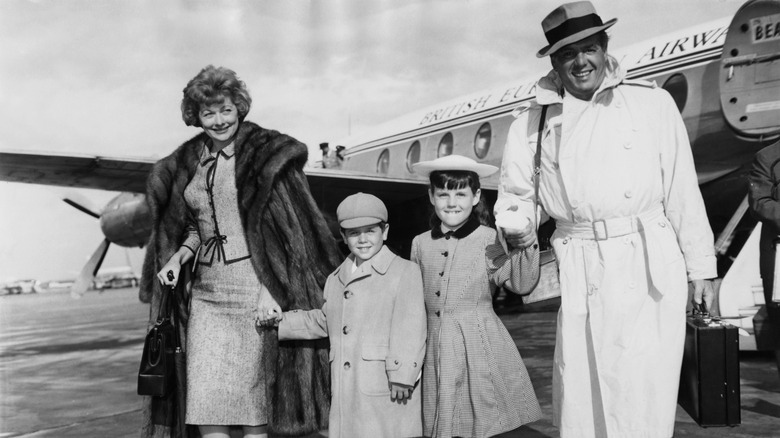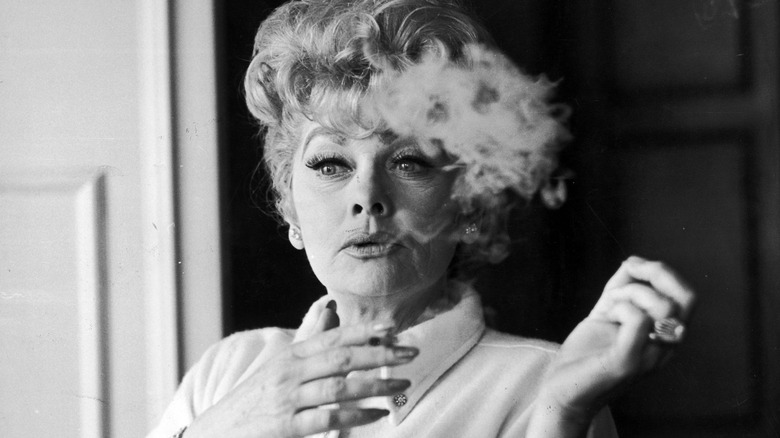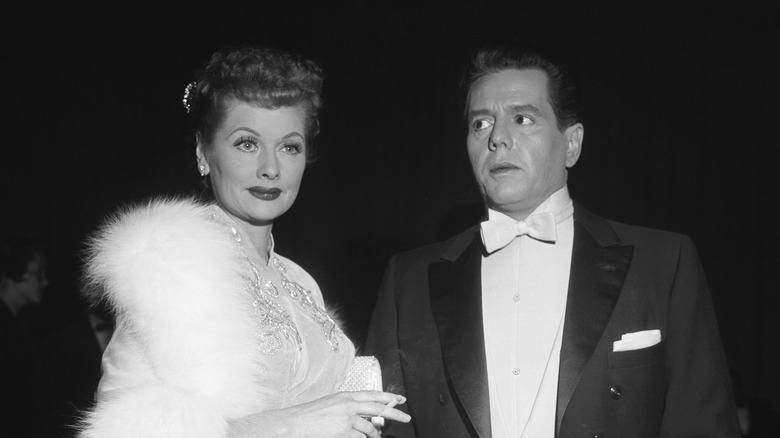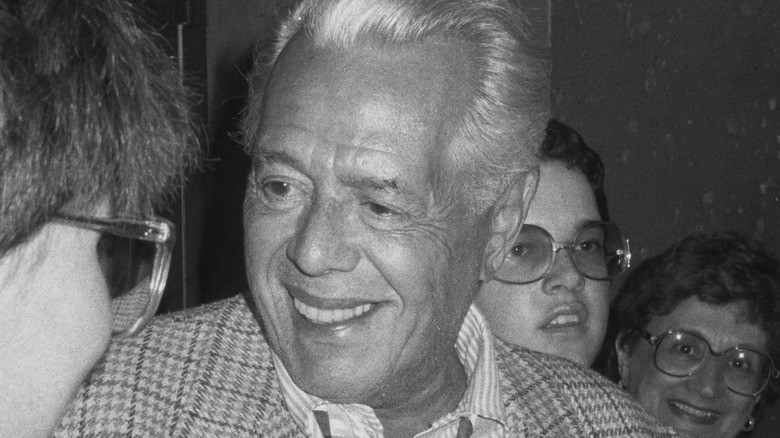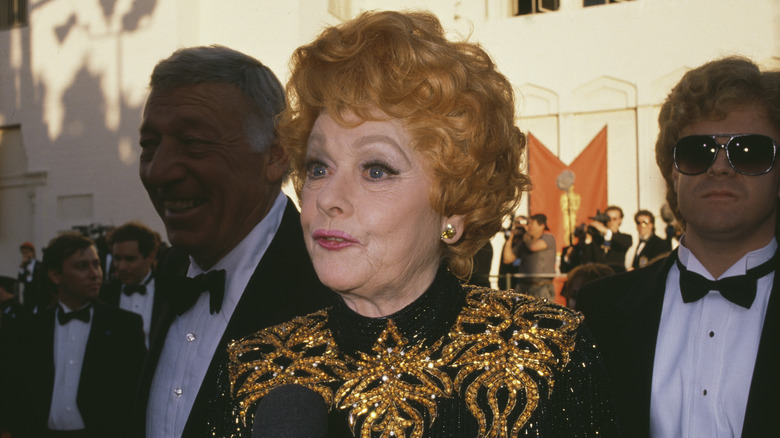Inside Lucille Ball And Desi Arnaz's Marriage
Lucille Ball and Desi Arnaz's on-screen marriage was possibly the most iconic in TV history, but their real love story was a lot more turbulent than any of their sitcom plots.
Ball was working on the RKO Studios film "Too Many Girls" when she first caught sight of Arnaz, who was the bandleader. As Arnaz admitted in his autobiography, the lines he used to pick her up were "the oldest in history—and the corniest." He asked the actor whether she could rumba and suggested he could teach her, pretending that Ball would have to dance a rumba for her role. They went out to a Mexican restaurant for dinner that night.
According to their biographer, Warren G. Harris, Ball was smitten from the start. "I never fell in love with anyone quite so fast," she later recalled. "He was very handsome and romantic. But he also frightened me, he was so wild." Keep reading to find out more about the real-life marriage behind Lucy and Ricky's charming sitcom antics.
The pair quickly eloped
After Lucille Ball and Desi Arnaz met, the pair embarked on a whirlwind romance, despite their jobs keeping them on different sides of the country.
Ball didn't entirely trust her new flame, who was touring as a musical act in 1940. According to the Herald Sun, one particularly nasty fight was sparked by Arnaz meeting up with his ex-girlfriend, Betty Grable. As soon as Ball found out, she reportedly called him a "Cuban sonofab***ch" in front of his mother, who was living in Arnaz's apartment at the time.
As he wrote in his autobiography, Arnaz proposed immediately after they reunited. Despite his nightly show at the Roxy in New York, he told Ball: "I have everything arranged to marry you tomorrow morning, if you would like to marry me." The next morning, they drove over to Connecticut, where Arnaz had a judge and a permit waiting for them, before racing back to the Roxy in time for his next evening show. "I knew when I met you things weren't going to be normal," Ball reportedly commented.
They almost divorced in 1944
The couple went through a rocky few years at the start of their marriage, as Country Living observed, and Lucille Ball even filed for divorce in 1944. She disliked her husband's drinking and was suspicious of his relationships with other women, so the pair apparently separated for months. They eventually reconciled over dinner, however, and immediately fell back into bed together.
In his autobiography, Desi Arnaz explained that Ball's court date for the divorce came right after their passionate reunion. The actor still insisted on going, since the press was already there, and she had bought a new suit and hat. "She went to court, got the divorce, came right back and joined me in bed," he recalled, adding that the divorce was never legally complete. "This, of course, annulled the divorce immediately because in California in those days there was a one-year waiting period between the interlocutory and the final, and if during that period the principals got together and had an affair, the divorce was automatically null and void."
They were the first interracial couple on TV
When Lucille Ball was first asked to star in her own TV show, she had to fight for her Cuban husband to be cast opposite her. It was difficult to break the tradition of exclusively white American couples being cast in sitcoms, but the actor had her heart set on a television gig for both of them. "She knew that if he went on the road with the band, he'd be catting around all the time. She wanted him at home, where she felt the marriage would have a better chance of lasting, which of course it did," Bob Weiskopf explained to Closer Weekly.
According to her biographer, Kathleen Brady, executives at CBS told her that the average viewer wouldn't accept a Cuban husband for a "red-blooded American girl" (via NPR). They were particularly concerned about losing their sponsor, Philip Morris cigarettes. Ball stood her ground, however, and told the network they would have to put up with Arnaz and his Hispanic accent if they wanted to cast her. She won that battle, and CBS soon had one of the biggest hits on TV, thanks to the comedic chemistry between Ball and Arnaz.
Lucille Ball had multiple miscarriages
Although Lucille Ball and Desi Arnaz wanted a child, they struggled to have a healthy baby during the difficult early years of their marriage. "Lucy had two or three miscarriages before she gave birth to little Lucie," Ball's closest friend, Lillian Briggs Winograd, told People in 1991. "She thought that having a baby would hold them together."
As Arnaz recalled in his book, Ball was emotionally wrecked by the first miscarriage. "Lucy was completely shattered," he wrote. "She felt unfit, unable. It was heartbreaking." Their doctor had encouraging, if slightly flippant, words for them, however, telling Arnaz: "This is what nature does to straighten things out. I'll bet you a dinner at Chasen's she will soon be pregnant again and won't have one bit of trouble."
In 1951, their prayers were answered, and Ball gave birth to a healthy girl, whom they named Lucie. And her next pregnancy would result in one of the most memorable episodes of "I Love Lucy."
Her pregnancy was written into I Love Lucy
One of the most iconic moments in early television came in "Lucy Is Enceinte," the special "I Love Lucy" episode where Lucy tells Ricky she's pregnant. But the sweet announcement, which came at the same time as Lucille Ball's actual second child, almost never reached the screen.
Jess Oppenheimer, the show's head writer and producer, was the one who suggested they deal with her real-life pregnancy by writing her baby into "I Love Lucy," per HuffPost. At the time, it was scandalous to suggest that Ball and Desi Arnaz's characters, who slept in twin beds as part of their chaste image, had made a baby. As the AV Club noted, the show wasn't even allowed to say the word "pregnant," so the episode title euphemistically used the French word "enceinte" instead.
CBS executives were scared to introduce the storyline, according to their biography "Desilu," and consulted their sponsor, Philip Morris Cigarettes, and Biow Advertising Agency. "We decided at once to give every script concerning pregnancy to a three-man committee consisting of a priest, a minister, and a rabbi," Ball recalled. "If they found anything objectionable in the script, we would abide by their decision."
The storyline was a record-breaking hit: During the episode where Lucy eventually gives birth to Little Ricky, more than 44 million viewers were glued to their screen. As "Desilu" noted, more people watched "Lucy Goes to the Hospital" than Dwight Eisenhower's presidential inauguration.
Desi Arnaz's infidelity was exposed by a tabloid
Lucille Ball and Desi Arnaz's personal struggles were exposed by the most notorious tabloid in '50s Hollywood. Confidential magazine was known for revealing the secrets of celebrities, and, in 1955, it ran the headline "Does Desi Really Love Lucy?" The story accused him of being a "Latin lothario" who "sprinkled his affections all over Los Angeles," reporting that Arnaz had hired multiple sex workers while married to Ball. "What's she upset about? I don't take out other broads," Arnaz reportedly told a friend after the story was published, according to Vanity Fair. "I just take out hookers."
Ball put a brave face on the situation, as her publicist Charles Pomerantz later told People. He found an advance copy for the couple, and Ball took the magazine into her dressing room while filming "I Love Lucy." "Everybody was frozen on the set," Pomerantz recalled. "She finally came out, tossed the magazine to Desi and said, 'Oh, hell, I could tell them worse than that.'"
His drinking embarrassed Lucille Ball
As the years went by, Desi Arnaz's drinking began to embarrass Lucille Ball. "He was never drunk on the set. But he did always think in terms of liquor," writer Bob Weiskopf recalled in an interview with People. "We once worked very late, and I started to look at my watch. Desi says, 'Jesus, I'm sorry, amigos. Who'd like something to drink?'" Weiskopf added that Arnaz would never mention food, just alcohol.
In their biography "Desilu," Arnaz defended his own predilection for alcohol. "I had always been a drinking man," the "I Love Lucy" star once said. "That first night after we went out after that rehearsal of 'Too Many Girls' at RKO, we both got bombed and had a ball," but, he wrote, eventually his wife grew tired of the antics and felt that, as a successful man in his position, he "should be more dignified."
Their daughter, Lucie, told Closer Weekly that "alcoholism" was one of the factors that broke up their marriage. She revealed that the more stressed her father became, the more he would drink. "And the worse their relationship was, the more he would drink, just to show her," she explained to the magazine. "It was just awful."
If you or anyone you know is struggling with addiction issues, help is available. Visit the Substance Abuse and Mental Health Services Administration website or contact SAMHSA's National Helpline at 1-800-662-HELP (4357).
They divorced for good in 1960
Lucille Ball and Desi Arnaz's marriage finally ended in 1960, as The New York Times reported, when Ball sued for divorce after years of terrible arguments with "a lot of anger and screaming," their daughter, Lucie, explained to Closer Weekly. "Their divorce was horrible ... We didn't have any abuse, but we did go through some pretty hard stuff and that's why my parents didn't stay together."
According to Arnaz's autobiography, he was the one who finally asked for a divorce. During a furious argument, Ball allegedly came at him with a dueling pistol, and he accused her of seeing another man. "Look, I know you didn't mean everything you said, but for the sake of the children let's try to make this as amicable as possible," Arnaz apparently said, telling her he promised to hire "a good lawyer" for her and to tell the press she was the one who sought the divorce. "We will have no trouble arriving at a fair financial settlement and all that other stuff, but please, don't you ever threaten me again," he apparently told her.
Lucille Ball purchased Desi Arnaz's shares of Desilu and became boss
Lucille Ball was a groundbreaking figure in television: Not only did she star in her own sitcoms, she also became the first woman to run a production company when Desi Arnaz sold her his shares of Desilu Studios. "I never wanted to be an executive, but when my marriage to Desi broke up after 19 years, I couldn't just walk away from my obligations and say 'forget it,'" Ball later recalled, per the Los Angeles Times. "We were an institution. Life takes guts. If you don't take chances, you'll never bathe again because you might get dirty again."
During her time as head of the company, Desilu introduced the world to series like "The Untouchables," "Star Trek," and "Mission Impossible." As her daughter, Lucie, told the Archive of American Television, however, Ball's decisions weren't always practical. "She had good instincts but didn't really enjoy the day-to-day business part of it at all," Lucie explained. Eventually, Ball sold the production company to Western Industries for $17 million in 1967.
The former couple remained lifelong friends
Although both Lucille Ball and Desi Arnaz remarried after their divorce, they never cut each other out of their lives. "My mother and my father stayed good friends," their daughter, Lucie, told Closer Weekly (via Page Six). "It took a few years to calm down, but they stayed friends 'til the bitter end. And that was good for the kids." Lucie told the magazine that, despite her parents' divorce, not only did they love one another until the very end, but that they also got along quite well with each other's new partners.
As Arnaz recalled in his 1976 memoir, their final scene together was "not easy." The last "Lucy-Desi Comedy Hour" meant they would appear as Lucy and Ricky for one more time, before ending their marriage and their on-screen partnership. The final scene consisted of "a kiss-and-make-up ending," he explained, describing how their final on-screen embrace was no "ordinary" kiss. "It was a kiss that would wrap up twenty years of love and friendship, triumphs and failures, ecstasy and sex, jealousy and regrets, heartbreaks and laughter ... and tears. 'I Love Lucy' was never just a title," added Arnaz.
Lucille Ball was there for Desi Arnaz during his bout with cancer
Sadly, Desi Arnaz's health declined during the '80s, when he was diagnosed with the cancer that would eventually lead to his death in 1986. His personal doctor, Charles Campbell, told the Los Angeles Times that Arnaz "died of lung cancer," adding, "It was from smoking those Cuban cigars, that's the truth."
As their daughter, Lucie, recalled in the biography "Desilu: The Story of Lucille Ball and Desi Arnaz," her mother came around to visit when it was clear that Arnaz was seriously ill. The pair watched tapes of their old shows together, reminiscing about the old days. And, in his final days, 48 hours before Arnaz died, Ball had an emotional call with her ex-husband. "I put the phone up to Dad's ear in the bed," Lucie said. "I said, 'It's the redhead.' He just listened and I heard what he said. She just said the same thing over and over again ... It was 'I love you. I love you. Desi, I love you.'"
Later, their daughter realized that their last conversation had taken place on November 30, which had been the couple's wedding anniversary.
She cried at his funeral
As the Los Angeles Times reported in 1986, Desi Arnaz was with family when he died at his Del Mar home in California. He was 69 years old at the time. "Mr. Arnaz had been ill with cancer for many months, and my family and I have been praying for his release from this terrible ordeal. Desi died early this morning in his daughter's arms," a statement from Lucille Ball's office read at the time. "Our relationship had remained very close, very amiable, over the years, and now I'm grateful to God that Desi's suffering is over."
Ball was one of 100 mourners in attendance at his funeral. She sat with their daughter, Lucie, and their son, Desi Jr., and cried apart from sharing her tribute to Arnaz, the man she spent 20 years with, whom she referred to as ″a great, great showman," according to AP News. ″Just look at the stuff he's done over the years ... He was a great part of our innovation in this business.″

